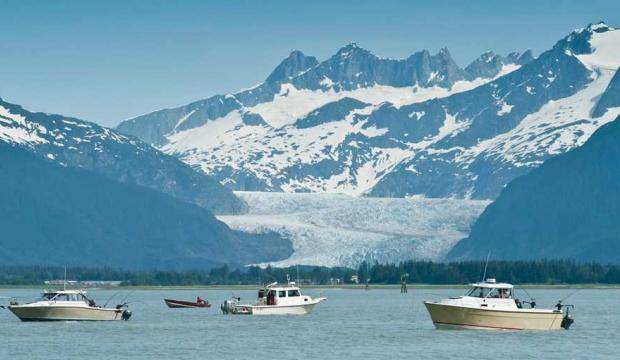The future of king salmon fishing in Southeast will change this week as the Board of Fisheries considers proposals to boost struggling Chinook stocks on the Chilkat and Taku rivers. The board convened in Sitka Thursday for a 13-day meeting that will resume Monday morning.
The meeting isn’t limited to king salmon. This year’s proposals cover everything from the number of crab pots a commercial Dungeness fisherman can use, to the use of deep-sea release mechanisms for rockfish and the opening of a commercial squid fishery.
Among the most consequential issues for Juneau-area fishermen are several proposals to boost struggling king salmon.
The number of spawning Chinook is at an all-time low on both the Chilkat and the Taku. That has led sport and commercial fishermen, as well as Alaska Department of Fish &Game, to call for a more conservative approach to management.
“Reduced productivity of Chinook salmon stocks is a major concern in Southeast Alaska,” ADF&G wrote in a prepared statement meant to draw attention to the issue.
Current Chinook management works like this: Using field research and statistical models, ADF&G biologists predict the number of king salmon returning to river systems in Southeast every year. For the Taku River, these numbers came out in December.
Those predictions are compared to an “escapement goal,” the number of fish that biologists believe need to make it upriver to reproduce and keep the salmon run healthy.
If the number of spawning fish is predicted to come above that escapement goal, ADF&G may allow fishermen to use two poles instead of one or keep more fish every day. If fish aren’t projected to return in healthy numbers, then ADF&G will limit fishing.
ADF&G hopes to see between 19,000 and 36,000 fish return to the Taku River. That goal hasn’t been met the last two years and three out of the last five years.
Fish &Game expects only 4,700 adult king salmon to return to the Taku River this year.
Returns on the Chilkat River near Haines have come in below escapement goals for four of the last five years and are expected to be 1,030, below the goal range of 1,750-3,500 this year. Chinook numbers for the Stikine and Unuk rivers are also expected to be below escapement goals.
Two “ABC” proposals would alter management rules to allow ADF&G to fine-tune fishing restrictions in both sport and commercial fisheries.
Proposal author Michael R. Bethers said management based on a wide escapement range isn’t enough.
His proposal is to limit sport fishing to certain boundaries and dates when escapement is projected to be in the upper (the “A” in the ABC), middle (B) and lower third (C) of the escapement range.
“Years of fishing on escapement is to a large degree why these stocks are at all-time lows,” Bethers wrote.
For instance, if Fish &Game projects around 19,000-24,666 adult Chinook will return to the Taku River — the lower third of the escapement range — fishing would be closed in districts 11 and 15. That includes the whole Juneau area and most of Lynn Canal save for the portion on the west side of Admiralty Island. Fishermen in districts 12 and 14, or Chatham and Icy straits, would be limited to one king salmon in this scenario.
Restrictions in the middle range of the escapement goal (roughly 24,666-30,332 fish) would call for Chinook fishing closures in an area south of Juneau April 15-June 15 when a bulk of the Chinook run is making its way into Taku River. Lynn Canal fishermen, in this scenario, would only be allowed to retain one Chinook a day.
If Chinook escapement is projected to fall between 30,332 fish and 36,000, the proposed restrictions would bar fishermen from retaining king salmon above Copper Point in Taku Inlet from April 15-June 15. Chinook retention above Eldred Rock in Lynn Canal would be closed in this scenario.
Bethers’ proposal for commercial management also hinges on thirds. His idea is to limit troll fishermen in Chatham and Icy straits to four days per week during spring fishing when the escapement prediction falls in the upper third.
Trollers would only be allowed to fish two days if it falls in the middle third, while spring Chinook fishing would be shut down for trollers from April 15-June 15 if forecasts for Taku Chinook fall in the lower third of the escapement range.
The Juneau-Douglas Advisory Committee, a group of commercial and sport fishermen who make recommendations to ADF&G, called for the Board of Fisheries to adopt the “most conservative, data-driven Chinook management approach that is practical” though they didn’t back a specific proposal.
“We are of the opinion that all user groups must participate in conservation,” the board stated while drafting a public comment Wednesday.
Sport fishing regulations will likely be the same this year as they were last year, ADF&G sport fish division biologist Dan Teske said at that meeting.
Last year, sport fishing was closed in the Juneau area from April 15-June 15 to protect Taku Chinook. A Southeast-wide moratorium on king salmon retention in salt water came later.
The emergency measures meant only 34 Taku River wild kings were caught during the fishing season last summer. Though Teske said that’s a pretty small number, which tells him the regulations fulfilled their goal of limiting sport harvest, the Board of Fisheries may direct ADF&G to take an “every fish in the gravel” approach.
“As far as I am concerned, as a manager, something similar to what we did last year is going to work. But the board is going to weigh in on all these action plan options, so I can’t say for sure because I have to take the board’s direction. If they want to protect fish down to every fish in the gravel and they shut everything down, then we are going to go with that plan,” Teske said.
• Contact reporter Kevin Gullufsen at 523-2228 and kevin.gullufsen@juneauempire.com. Follow him on Twitter at @KevinGullufsen.

